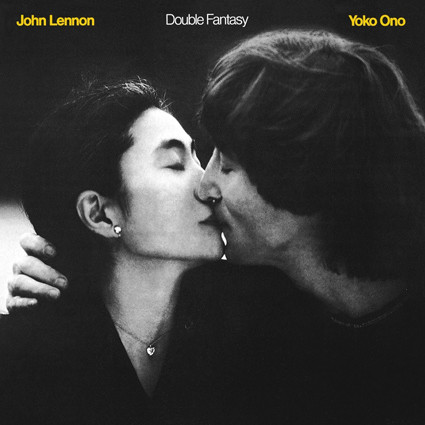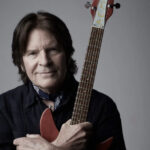 Double Fantasy John Lennon Album Cover
Double Fantasy John Lennon Album Cover
John Lennon’s Double Fantasy, released in 1980, holds a unique and often debated position in music history. Intended as his triumphant return after a five-year hiatus from the music industry, the album arrived with significant anticipation. However, initial reactions were mixed, and it was only after Lennon’s tragic murder outside The Dakota that Double Fantasy ascended to iconic status, winning a Grammy Award for Album of the Year. This dramatic shift in perception prompts a critical re-examination: Is Double Fantasy a genuinely great album, or is its legacy more a product of circumstance and sentimentality?
Prior to his self-imposed “househusband” period, John Lennon had already established himself as a musical titan. From his groundbreaking work with The Beatles to his politically charged and deeply personal early solo albums like Plastic Ono Band and Imagine, Lennon’s artistic contributions were undeniable. He consistently pushed boundaries, both musically and lyrically, earning him a place as one of the most influential songwriters of the 20th century. This context of prior brilliance sets a high bar against which Double Fantasy must be judged.
Double Fantasy is structured as a dialogue between John Lennon and Yoko Ono, with tracks alternating between the two artists. This format itself was somewhat novel for the time and aimed to reflect their personal and artistic partnership. Thematically, the album is deeply rooted in domesticity, love, and the simple joys of life – a stark contrast to some of Lennon’s earlier, more turbulent work. This thematic shift is immediately apparent in the lead single, “(Just Like) Starting Over.”
However, the critical reception upon its initial release was far from universally positive. Many prominent music publications, including Rolling Stone, The Times, and The Village Voice, offered lukewarm or even negative reviews. Critics often found Lennon’s contributions to be uninspired, lyrically simplistic, and musically bland compared to his previous output. Sales were initially sluggish, suggesting that the record-buying public also shared some of these reservations.
Tracks like “(Just Like) Starting Over” exemplify some of these criticisms. While commercially successful and undeniably catchy, the lyrics are often described as pedestrian and lacking the depth and complexity that characterized Lennon’s best work. Lines such as “Our life together is so precious together” and “It’s time for us to spread our wings and fly” feel simplistic and cliché, especially coming from a songwriter known for his poetic and often provocative lyrics. Musically, the doo-wop backing vocals and somewhat derivative melody further contributed to the sense that Lennon was not breaking new ground. The absence of Earl Slick, a notable guitarist, also marked a departure from the rock edge often associated with Lennon’s sound.
In contrast, Yoko Ono’s contributions to Double Fantasy are often viewed in a different light. Tracks like “Kiss Kiss Kiss” showcase a more experimental and avant-garde approach, incorporating elements of New Wave and dance music that were emerging in the late 1970s and early 1980s. While Ono’s vocal style is unconventional and her lyrics can be unconventional and sometimes nonsensical, they are arguably more adventurous and reflective of the evolving musical landscape than some of Lennon’s more conventional songs on the album. The presence of Earl Slick on tracks like “Kiss Kiss Kiss” highlights a musical energy that is sometimes missing from Lennon’s songs on Double Fantasy.
“Cleanup Time,” Lennon’s track following “Kiss Kiss Kiss,” further underscores the critical divide. Often described as limp and forgettable, it lacks the energy and innovation of Ono’s preceding track. The lyrics, referencing “the queen is in the counting house” and “the king is in the kitchen,” have been interpreted as out of touch and self-absorbed, particularly for listeners not living in opulent circumstances. The musical arrangement, while featuring Earl Slick on guitar, is considered by some to be hackneyed and lacking in originality.
Ono’s “Give Me Something” continues in a more dance-oriented vein. While the lyrics may be repetitive and the backing vocals arguably jarring, the track possesses a rhythmic drive and energy that is distinct from Lennon’s more mellow contributions. Earl Slick’s guitar work again provides a notable highlight, even if it’s somewhat buried within the mix.
Lennon’s “I’m Losing You” is often cited as one of his stronger tracks on Double Fantasy. It is arguably the closest he comes to a rock song on the album and expresses a sense of vulnerability and tension that is less evident in some of his other love songs on the record. While the melody may not be his most memorable, the song’s psychological depth and emotional rawness offer a glimpse into a more complex dynamic than the idealized domesticity presented elsewhere on the album. Earl Slick’s brief guitar solo at the end is frequently praised as a standout musical moment.
Ono’s “I’m Moving On” is sometimes compared to “I’m Losing You” in its thematic and musical feel. However, Ono’s vocal delivery is often described as stilted, and the lyrics are considered by some to be awkward. Despite these criticisms, the track is notable for its unconventional elements, including Ono’s spoken word interjections.
“Beautiful Boy (Darling Boy),” Lennon’s ode to his son Sean, is undeniably a tender and heartfelt ballad. However, it is also often characterized as sentimental and even mawkish by some critics. The famous line, “Life is what happens to you while you’re busy making other plans,” while widely quoted, is noted to be a pre-existing adage, not an original Lennon lyric.
“Watching the Wheels” is frequently cited as one of Lennon’s more listenable tracks on Double Fantasy. It possesses a more upbeat tempo and a more engaging melody than some of his other contributions. However, the lyrics, particularly lines like “People asking questions, lost in confusion, well I tell them there’s no problem, only solutions,” are sometimes seen as arrogant and hypocritical, especially in light of Lennon’s own wealth and privilege, echoing critiques of “Imagine.”
Ono’s “Yes, I’m Your Angel” is often dismissed as one of the weaker tracks on the album, while Lennon’s “Woman,” despite its melodic appeal, is critiqued for its lyrical dependence and perceived infantilization of Lennon’s relationship with Ono. Lines like “Woman, I hope you understand, the little child inside the man, please remember, my life is in your hands” are seen by some as reinforcing a narrative of unhealthy dependency rather than mature romantic love.
Ono’s “Beautiful Boys” is a slow, introspective track dedicated to both her son and husband. While containing a perceptive line about Lennon’s potential inner emptiness despite outward appearances of contentment, it is also criticized for Ono’s vocal performance and maudlin lyrics.
Lennon’s “Dear Yoko” is a short, upbeat track expressing his devotion to Ono. However, it is often seen as lyrically simplistic and musically uninspired, with a repetitive melody and a lackluster arrangement. The absence of Earl Slick is again noted.
Ono’s “Every Man Has a Woman Who Loves Him” is surprisingly praised by some critics as a standout track on Double Fantasy. Its funky, sinuous beat and more sophisticated musical arrangement are seen as a welcome contrast to some of Lennon’s more conventional songs. Earl Slick’s guitar work and the overall production are highlighted positively.
The album concludes with Ono’s “Hard Times Are Over,” a gospel-tinged track with a message of optimism. However, Ono’s vocal performance is again cited as a weakness, and the melody is considered somewhat jerky and uneven.
In conclusion, Double Fantasy is a complex and contradictory album. While it achieved massive commercial success and iconic status after John Lennon’s death, a critical re-evaluation reveals a more nuanced picture. Lennon’s contributions, while commercially accessible, are often seen as lyrically and musically weaker compared to his earlier work. Yoko Ono’s tracks, while unconventional and sometimes challenging, are arguably more adventurous and reflective of contemporary musical trends. Charles Shaar Murray’s assessment in NME – “It sounds like a great life, but it makes for a lousy record” – encapsulates a common critical perspective. Double Fantasy remains a significant album in Lennon’s discography, but its artistic merit continues to be debated, often overshadowed by the tragic circumstances surrounding its release and the powerful emotions associated with Lennon’s legacy.

